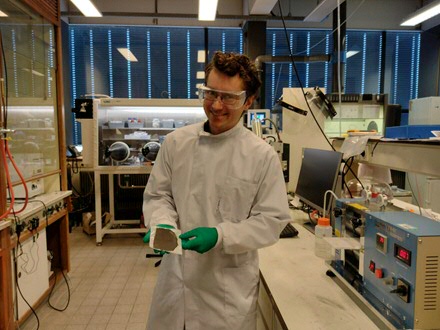Advent calendar - December 19th - Winfried de Haas
In the Zernike Institute Advent Calendar, we are presenting 24 short spotlights in December. In these specials, we highlight PhD students, postdocs, support staff, and technicians of our research groups and team - providing a glimpse in their typical day at work. In Episode 19 meet Winfried de Haas, PhD student in the Materials Chemistry group led by prof. Moniek Tromp.

I am nearing the end of my PhD project in the Materials Chemistry group led by prof. dr. Moniek Tromp. The research I have been doing concerns studying batteries during their charging and discharging and as such understand their performance. It starts with running battery charge-discharge measurements. Then, when the batteries work, we apply characterization techniques including x-ray diffraction and x-ray absorption spectroscopy, firstly ex-situ and then operando in specially designed cells. Due to the deadline of the thesis getting closer though, I find myself more in the office writing the chapters and analysing the data we gathered during my project.
My project involves the NiFe battery in combination with performance-enhancing additives. The NiFe battery is a potentially more cost-efficient battery than Li-ion batteries, while being more sustainable. These batteries can exhibit a complicated “soup” of species in the electrolyte as well as in the electrode. Where these species travel in the battery and how they interact is crucial for understanding the battery chemistry. This battery is already over a hundred years old. I find it fascinating that we can still learn a lot of new things about it with the help of modern advances in measurement techniques.
When successful, operando battery research yields a lot of high-quality data opening up a wealth of information, providing answers towards performance, as well as a lot of new questions to pursue. This makes the data analysis very complex, but very satisfying when different techniques come together, and the puzzle falls into place. With this knowledge in hand, we can move to even more clever ways to improve our batteries.
More news
-
15 September 2025
Successful visit to the UG by Rector of Institut Teknologi Bandung
